Here’s the coronavirus death toll through December 19. The raw data from Johns Hopkins is here.
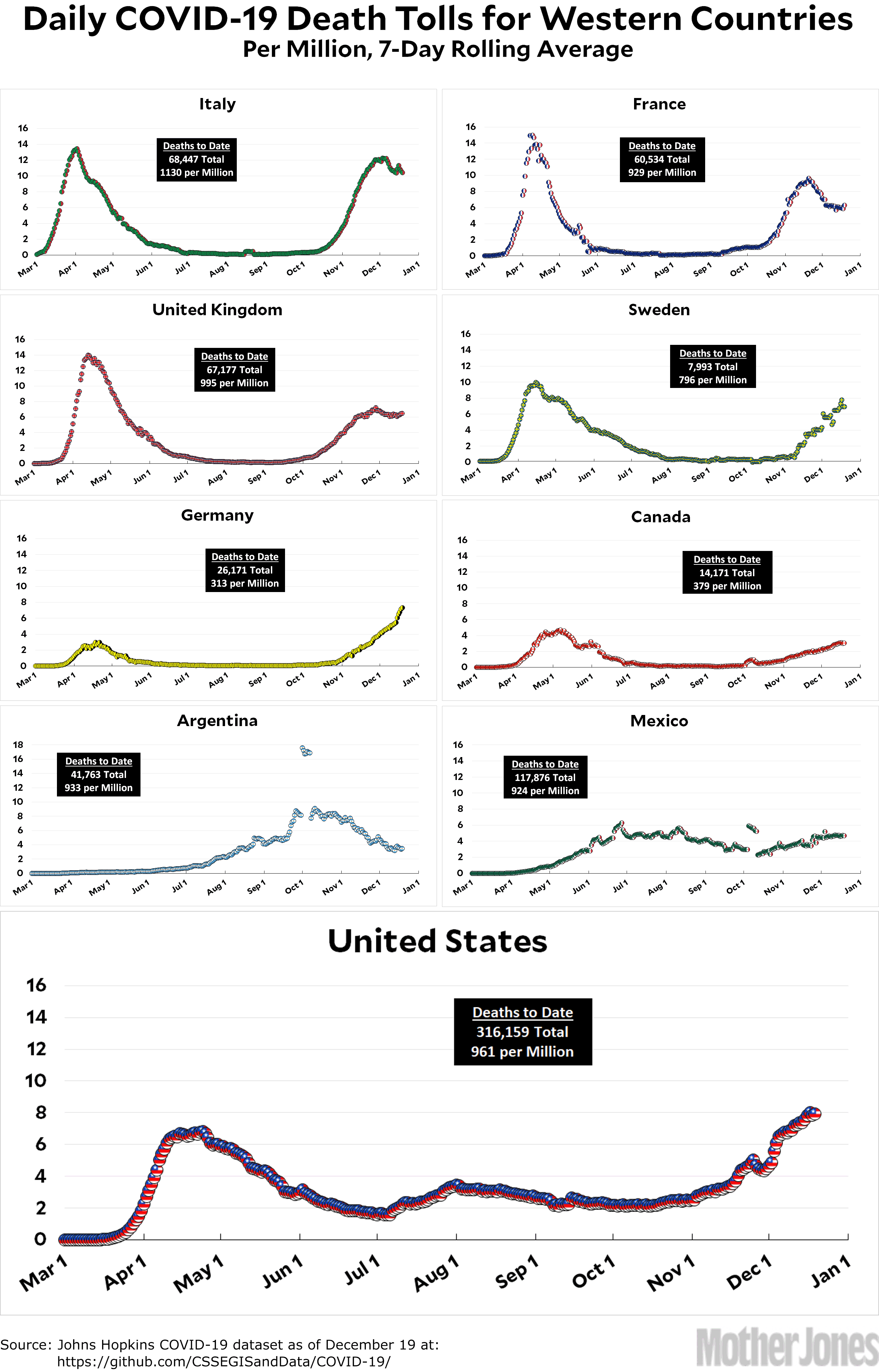

Here’s the coronavirus death toll through December 19. The raw data from Johns Hopkins is here.

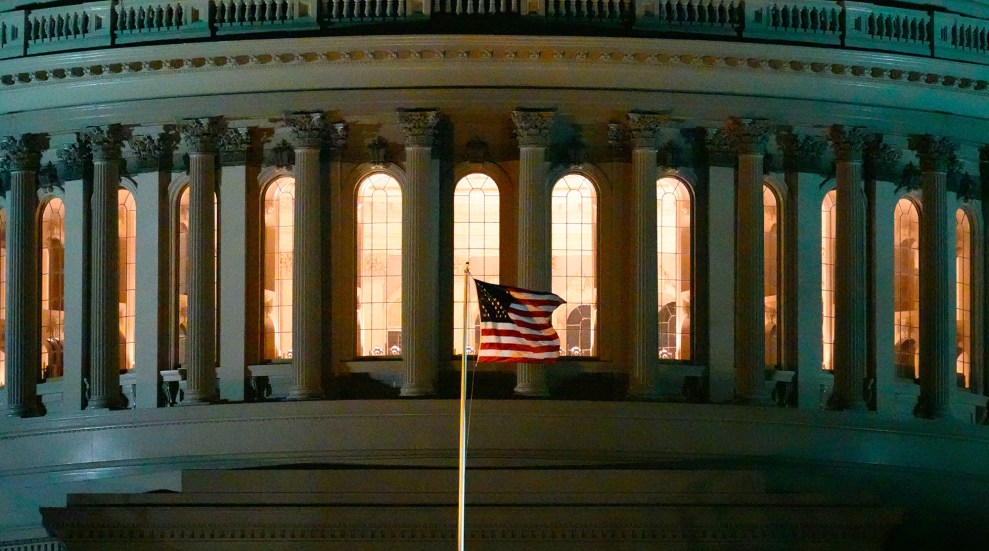
Congress is working feverishly through the night to bring America the coronavirus relief it needs.Kevin Drum
Good news on the stimulus front tonight:
Senators reached an agreement on the Federal Reserve’s emergency lending powers late Saturday, clearing the last major hurdle on a $900 billion coronavirus-relief package, according to aides from both parties.
….Mr. Schumer told reporters he thought both the House and Senate would be able to vote Sunday on the relief bill, which is expected to be combined with a spending bill needed to avoid a partial government shutdown. The government’s current funding expires at 12:01 a.m. Monday.
….The relief package under discussion is expected to include $300 a week in enhanced unemployment benefits, a second round of stimulus checks and funding for schools, health-care providers, vaccine distribution and small businesses. Negotiations accelerated this week after congressional leaders agreed to drop two provisions: funding for hard-hit state and local governments, which Democrats and some Republicans had sought, as well as liability protections for businesses and other entities operating during the pandemic, a top GOP priority.
The enhanced unemployment benefits will run through early spring. This is disappointingly short, but nonetheless a big help for those who have been furloughed due to coronavirus shutdowns.
Here is Saturday night’s view of the not-seen-since-Genghis-Khan conjunction of Jupiter and Saturn. Do they look closer than they did yesterday? I guess a little bit. Maybe?

Here is the front page of the New York Times at the moment:
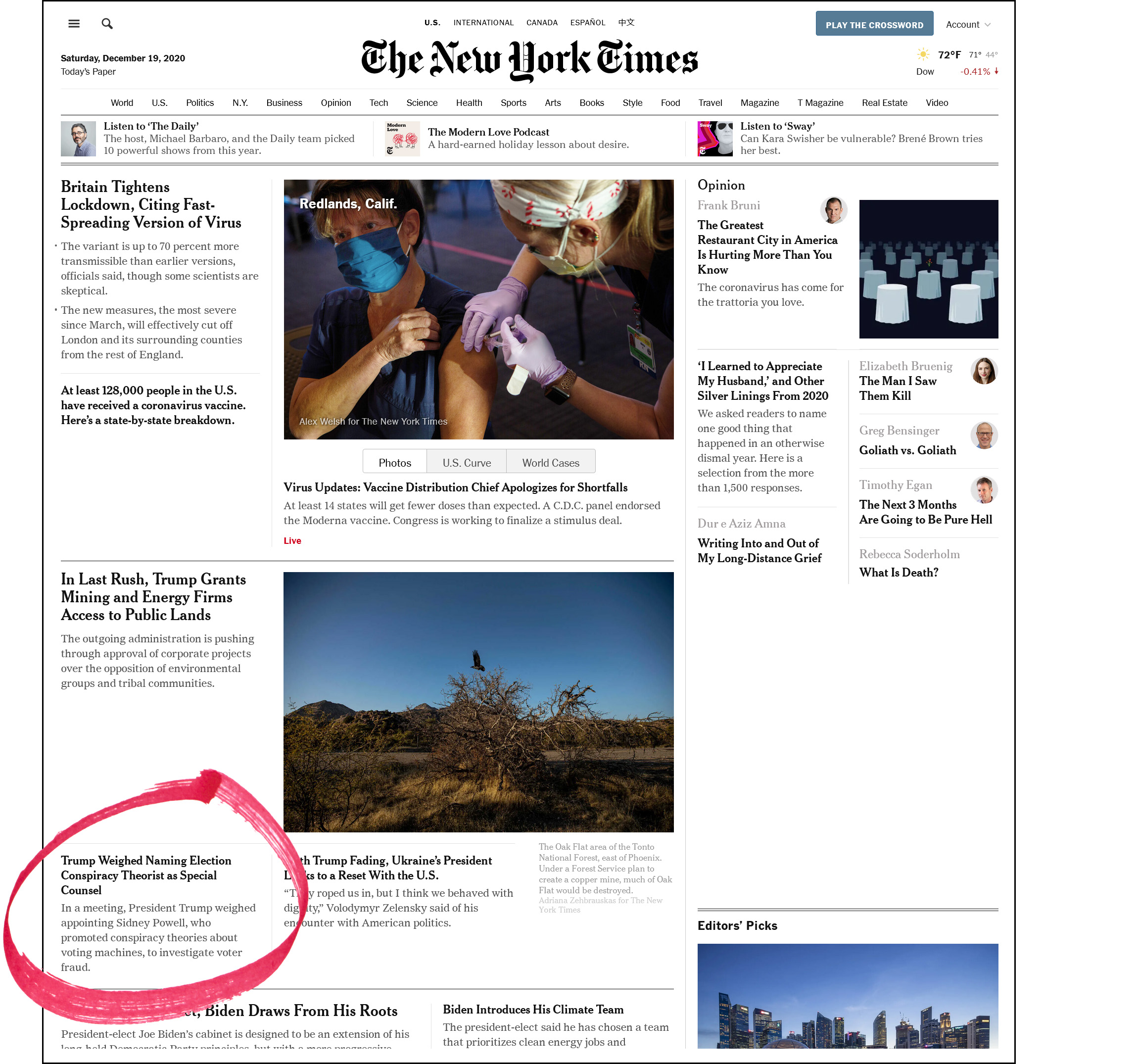
Down below the fold, just barely beating out “Biden Introduces His Climate Team,” is a story headlined “Trump Weighed Naming Election Conspiracy Theorist as Special Counsel.” The conspiracy theorist in question is Sidney Powell, who is indeed a complete loon. However, if you click the link and read down to the sixth paragraph, you learn this about Friday’s meeting at the White House:
Ms. Powell’s client, retired Lt. Gen. Michael T. Flynn, the former national security adviser whom the president recently pardoned, was also there….During an appearance on the conservative Newsmax channel this week, Mr. Flynn pushed for Mr. Trump to impose martial law and deploy the military to “rerun” the election. At one point in the meeting on Friday, Mr. Trump asked about that idea.
Now, I’m not a Times editor with decades of experience with this stuff, but doesn’t this seem a wee bit more important than whether a nutter is appointed special counsel for a few weeks? And also perhaps more important than “Britain Tightens Lockdown” at the top of the page?
It does to me! The president of the United States asked a bunch of his advisors about the feasibility of imposing martial law and having the Pentagon run a new election. In other words, staging a military coup. Sure, everyone at the table shot it down, because even Rudy Giuliani isn’t that far gone. But he asked! The president of the United States! What does Trump have to do these days to rate a bigger headline? Invade Canada?
Here’s the coronavirus death toll through December 18. The raw data from Johns Hopkins is here.
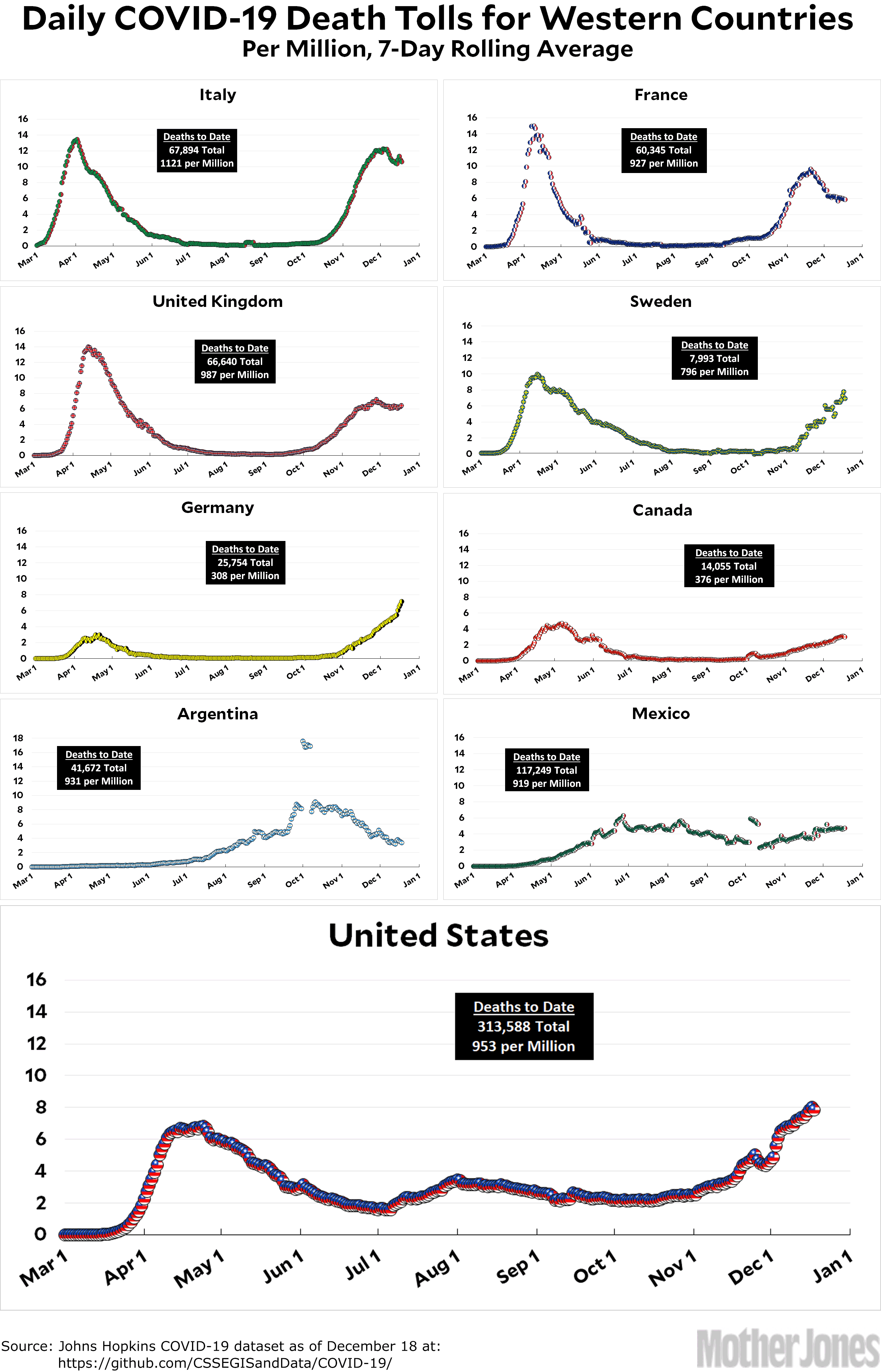
Here it is, the fabulous Jupiter-Saturn conjunction with only three days to go. They’re getting close! Saturn is on top, Jupiter on the bottom.
This was a bit of a quickie, shot right outside my door in between plays of the so-called Pac-12 championship. I’ll try to do a little better tomorrow.

A team of researchers led by a group from Oxford University has published an interesting new study about the effectiveness of various interventions in the fight against COVID-19. Here are their basic results:
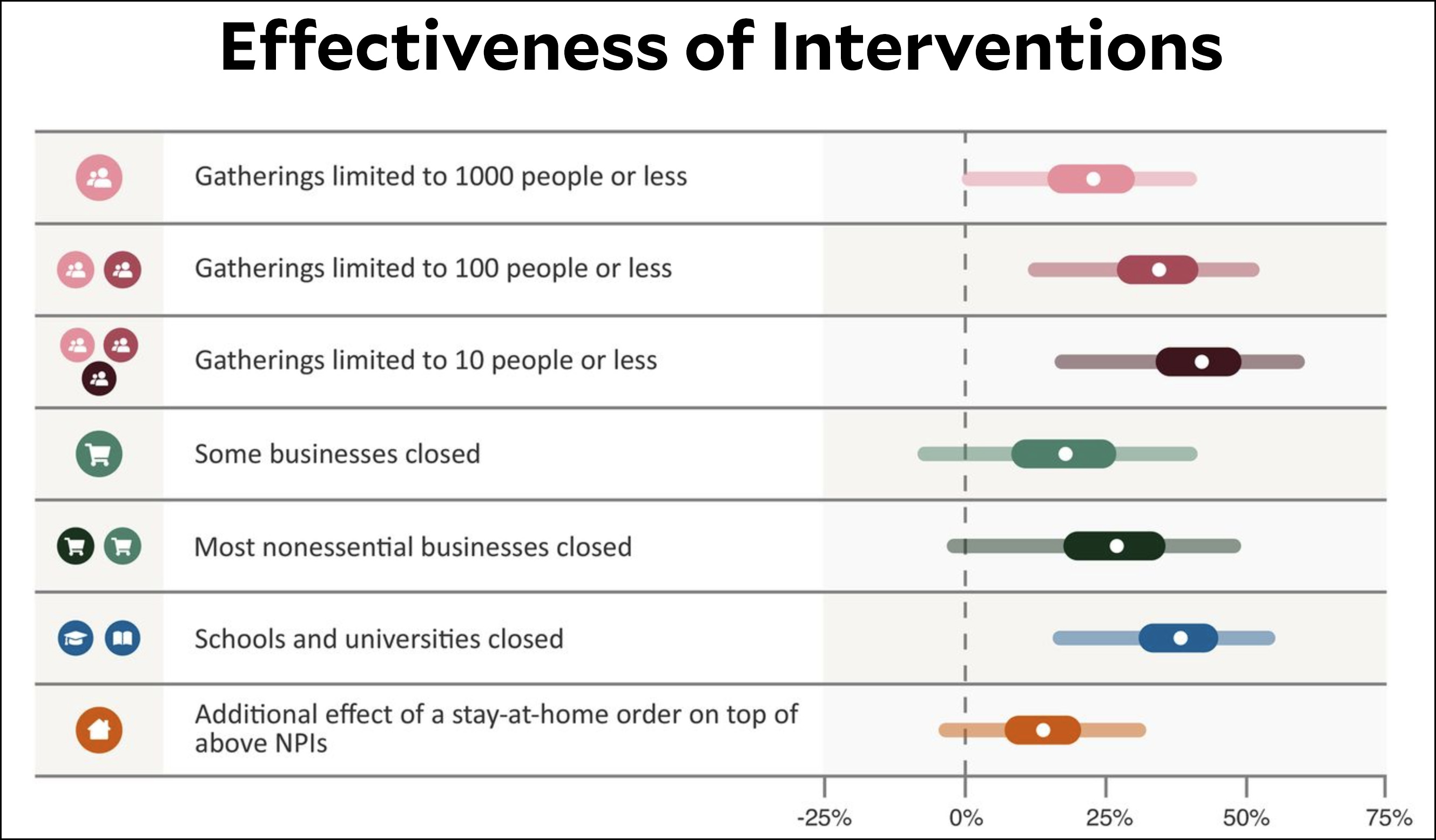
Unlike some previous studies, this one finds that closing schools and universities can be quite effective—along with very strict limits on gatherings. Stay-at-home orders, conversely, have very little effect.
Unfortunately, the study methodology was unable to distinguish between different kinds of school closure (elementary vs. high school vs. university), which severely limits its usefulness. Existing research already suggests that there may be a big difference between opening primary schools vs., say, opening high schools, where kids are far more likely to break quarantine and become infected. Nor does this study account for the impact that school closures have on learning for young children, which is already thought to be considerable. It’s strictly about the overall impact on disease transmission.
This is a big drawback. At the same time, if you simply accept this study as one more data point among many, it has some value. For one thing, the authors are able to estimate the effectiveness of multiple interventions:
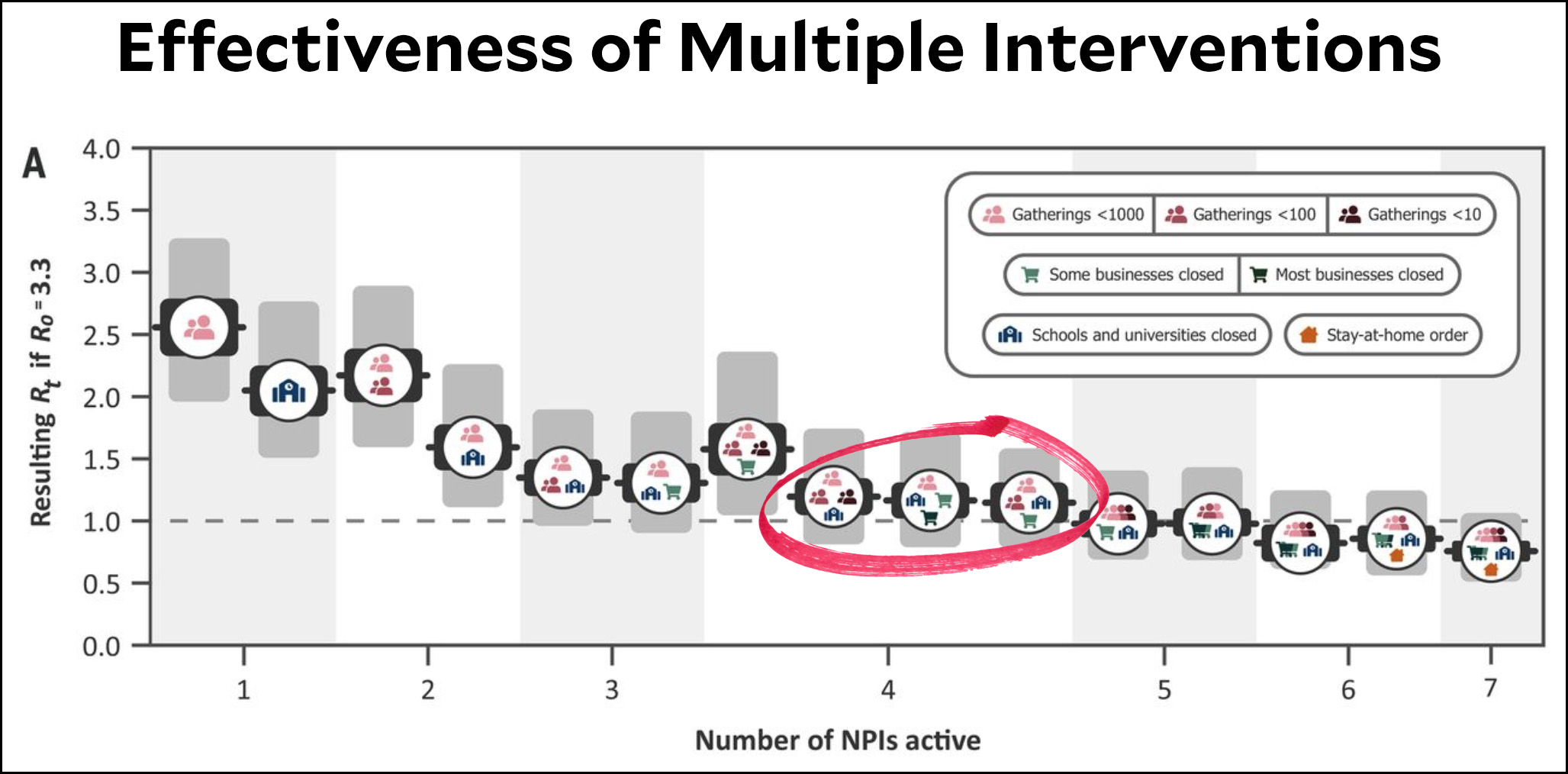
This has a chance of being useful to policymakers. Take a look at the three interventions that I’ve circled. All three include a ban on gatherings of over a thousand people plus a shutdown of schools. Option 1 adds a ban on gatherings over ten people. Option 2 closes nearly all businesses. Option 3 bans gatherings over 100 people and closes some businesses. All three are predicted to have about the same effect. Which do you choose?
Obviously I’m oversimplifying here, especially since this is just one study among many. But this is the kind of information we need in order to deal with future pandemics most effectively. After all, you didn’t think that COVID-19 would be the last pandemic ever, did you?
Here is Hopper, giving Donald Trump a final evil eye as he gets carted off to the ash heap of history on the cover of our latest issue. If you’re not a subscriber—well, why aren’t you? You can subscribe here. Plus it makes a great gift! Or you can buy a copy at your local newsstand. Believe me, you do not want to disappoint Hopper on this score. She is not a cat to be crossed.
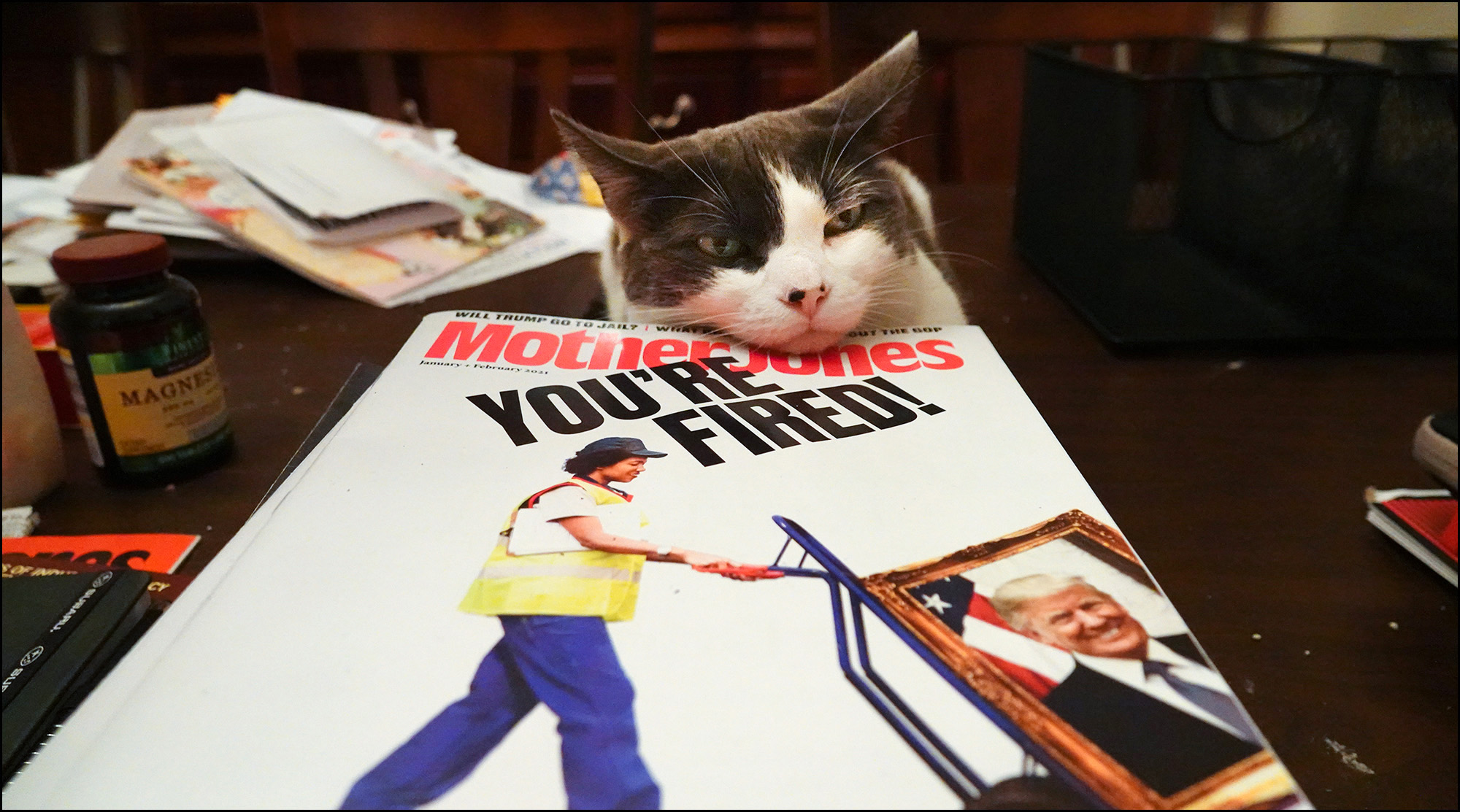
This tweet seems to be getting a fair amount of attention this morning:
The US CDC is going to recommend that ‘essential workers’ are vaccinated before the over-65s, despite their *own modelling* showing this will result in more deaths.
Why? They say it is unethical to prioritise the elderly because they are not racially diverse enough. THREAD.
— David Algonquin (@surplustakes) December 17, 2020
The CDC recommendation in question is about who to prioritize first for the COVID-19 vaccine after frontline health care workers have been vaccinated: essential workers, high-risk adults, or the elderly. The answer is partly based on which strategy would prevent the most deaths, but it turns out that this depends a lot on whether the Pfizer and Moderna vaccines merely protect individuals from the coronavirus, or if they also prevent transmission to other people. We don’t know with certainty yet, but the testing so far suggests that they do in fact prevent or reduce transmission. If that’s the case, here’s the relevant CDC chart:
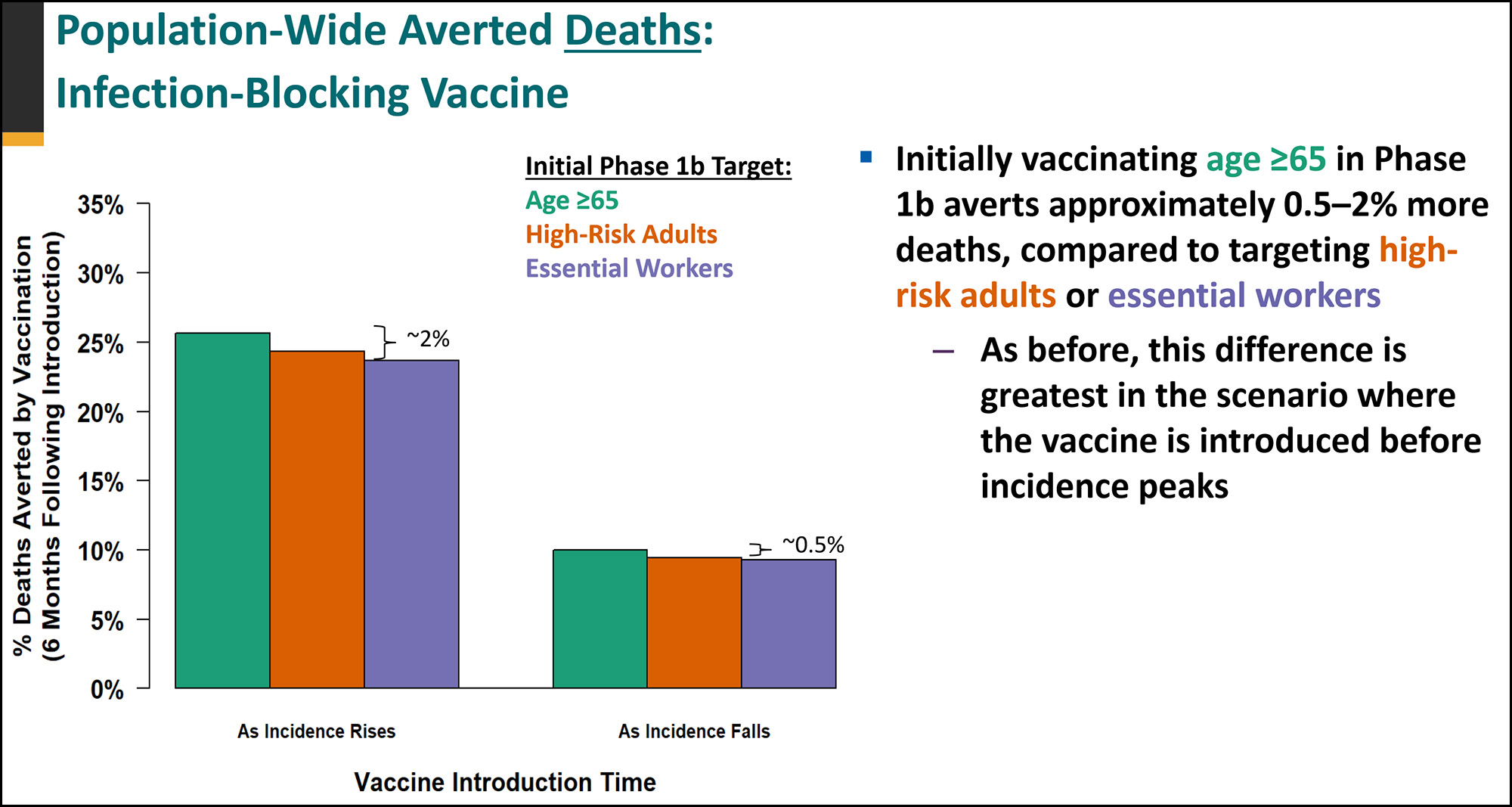
As you can see, vaccinations of all three groups produce very similar numbers of averted deaths. There are no error bars on this chart, but I’d guess that they’re fairly large, which justifies the CDC assertion that differences between the three groups are “minimal.” So the CDC moves on to ethical considerations. Here’s their summary:
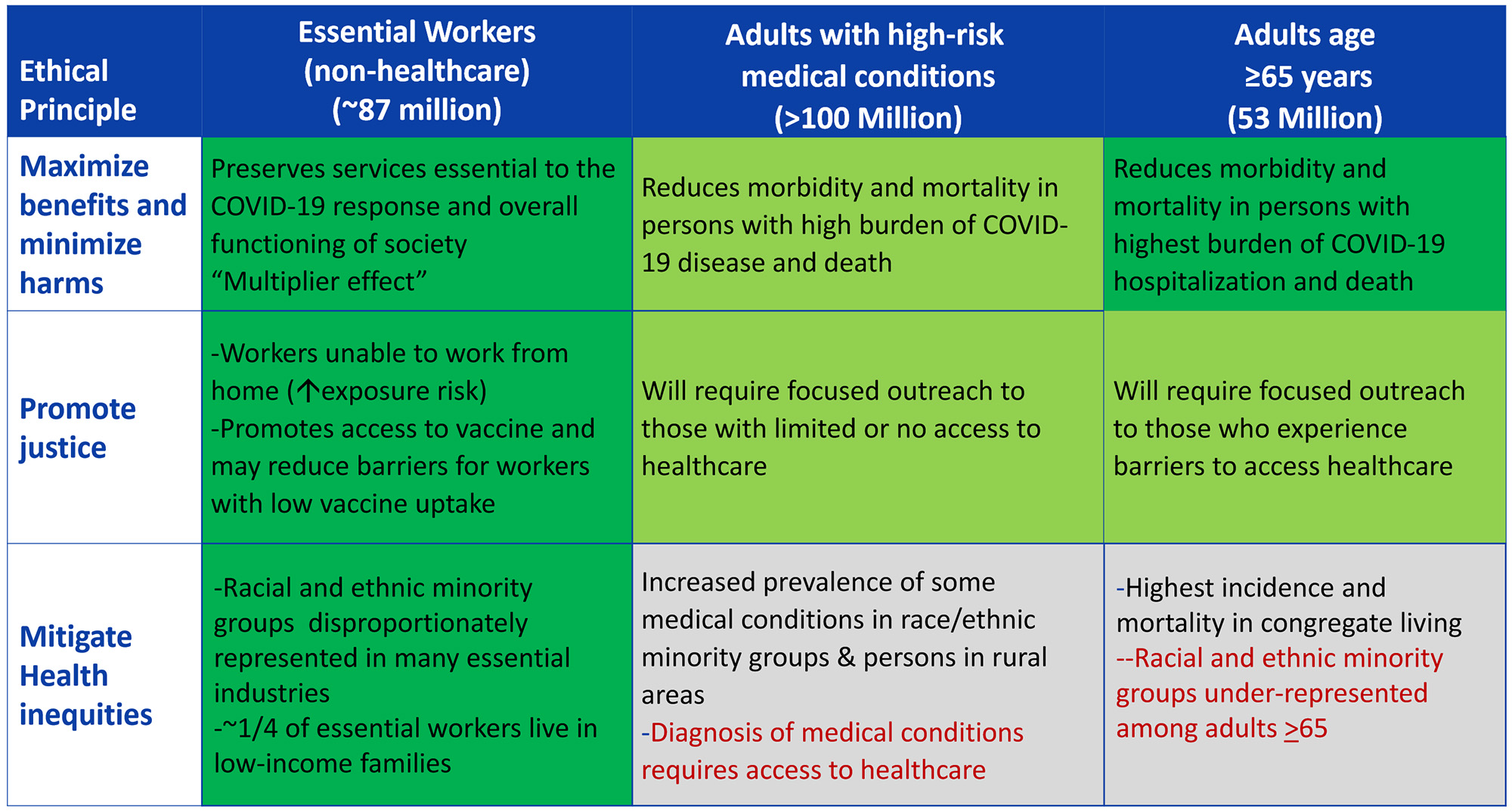
It’s true that CDC lists underrepresentation of racial and ethnic minority groups in the 65+ population as one issue among a dozen. But this is a very far cry from saying “it is unethical to prioritise the elderly because they are not racially diverse enough.” CDC says nothing of the sort, only that it’s one factor among many worth considering, especially given that the number of deaths averted is a close enough call not to be determinative.
This little kerfuffle highlights one of the ways in which racial justice is so hard to attain. In order to address it, you have to actually take it into account. But if you take it into account, you’ll be accused of racial bias or worse. It’s one of those things that sounds fine in principle, but there are always people around to complain if you do it in practice.
One way or another, we all have to make up our minds. If we believe in racial justice, it means taking it into account in the real world.
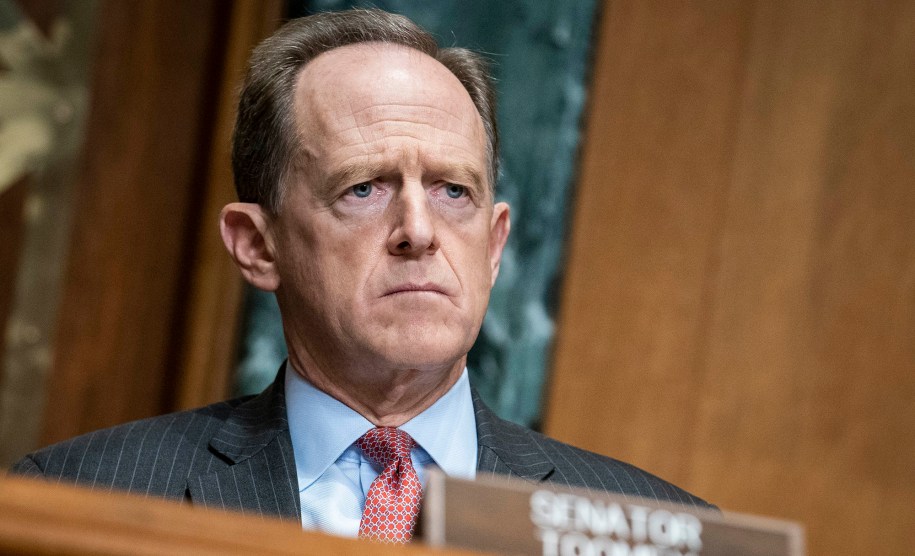
This man is deeply concerned that the Fed might help out a future Democratic president.Sarah Silbiger/CNP via ZUMA
The New York Times reports that congressional Republicans have invented yet another reason to oppose the latest coronavirus relief bill. They’ve now decided that the Fed has too much power to help out future presidents:
The proposal, fiercely opposed by Democrats who argue it would revoke a crucial tool to stabilize the sputtering economy, emerged as perhaps the thorniest point of contention among a handful of remaining issues holding up an agreement. It could strike at the heart of the Fed’s role as a “lender of last resort,” and curtail President-elect Joseph R. Biden Jr.’s latitude in dealing with the continuing economic fallout from the pandemic.
….A senior Democratic aide said that an agreement had been in sight before Senator Patrick Toomey, Republican of Pennsylvania, moved to insert a measure to bar a future Treasury secretary from restarting Fed emergency loan programs. The programs have kept credit flowing to medium-sized businesses, state and local governments and corporations amid the pandemic. Concern centered on the broadness of Mr. Toomey’s proposal: It would prohibit both those programs and “similar” ones in the future, which could severely curb the Fed’s crisis-fighting power.
It’s no coincidence that this last-minute concern comes just four weeks before a Democrat will be entering the White House. After all, what’s the point of sabotaging the economy when a Democrat is president if the Fed is just going to bail him out? This needs to be taken care of pronto, my friends.